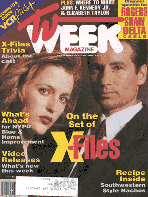

In the 1960s about the most fun you could possibly have as a kid was to stay up late and watch The Twilight Zone, The Invaders or The Outer Limits, three shows that scared the heck out of me and most of my peers. They were scary because despite the outrageous premises and characters that were introduced, they took themselves seriously.
Chris Carter never forgot the shows that affected him when he was growing up. So, after a career that saw him moving from freelance journalism to Walt Disney screenwriter, he came up with an idea for a show that he believed would have the same impact on today's teenagers that The Twilight Zone had on him.
It was called The X-Files and, in its second season on Fox Broadcasting it has managed to carve a niche for itself as one of the most popular shows on the network. Like its '60s predecessors, The X-Files takes itself seriously. It starts David Duchovny and Gillian Anderson as two FBI agents who were once assigned to investigate unsolved cases that suggest involvement of the paranormal. They have been re-assigned but they can't let go of their investigation of the unexplained.
Carter not only created the show but also acts as its producer and head writer and has even directed an episode. He says that in order for X-Files or any series to work, the premise has to have the potential for a long run. That requires characters and situations that can keep the interest of the public week after week, and an idea that lends itself to longevity.
"You have to create a situation that you like and from which stories can spring. Some ideas just seem like a TV show in that you can go somewhere with it week after week. This show felt like that to me. I felt that there would be a long life for it if we kept the quality and told good, interesting tales."
Carter says that like the shows of the 1960s X-Files has to seem real in order to be taken seriously. "It takes place in what I call the realm of extreme possibility. I sent out orders to the staff and myself that it has to be believable. It has to have a kernel of scientific basis. From there you can speculate and go far out. The show is only as scary as it is real. Some of the shows seem very real, some of them have the most impressionistic element of the unknown. That's what Outer Limits and Twilight Zone did so well. Like those shows, we have a line we walk, a line that keeps it serious rather than silly."
Staying on the right side of the line is particularly difficult for Anderson and Duchovny. Says Duchovny, "It's a little more outrageous than most shows because you always have to come up with your motivation from your own life experiences. Sometimes it's harder because one doesn't usually encounter aliens in one's life. Mulder doesn't laugh at himself. But sometimes when I'm watching I will think 'That's far fetched.' Or I'll have a chunk of dialogue and I'll say it as fast as I can. It's not always easy to give complete conviction to a line when it's far fetched. But I like the role and I really think that Mulder is a strong character."
Carter says writing episodes of a series about the unexplained is the easy part. The difficult part comes when you have to create the vision for television. He says the process takes place in such a limited time span that if he and his co-writers haven't thought about every frame and what occurs in it while they are writing then they could end up being quite surprised when they see the work.
"A really good writer thinks like a prop man and a set decorator and all the department heads when he is writing the script so that it is easier to communicate what is needed when he sits down with them to go over the script. That doesn't mean that I, as a producer, dictate to them what they should be doing. But as the writer, I have made a choice of the way I think the script should be carried out. They then tell me, as experts on their particular areas, how they think the scene should be handled. Because I've made a choice, I can vary from that choice. I can be flexible if I believe that being flexible would make the scene better."
It helps, of course, if you're working with people who are ahead of the game. Todd Pittson, the show's location manager, says that X-Files is the only show that he has ever worked on where the writers have actually asked for locations before the script is completed. That, he says, allows him to be a part of the creative process.
"I'm always talking to the writers and as soon as they get a script idea we discuss it. There was this one
time where one of the writers told me he had this idea to use a mansion and I told him not to do it because
mansions are a big problem right now. They've been overused. I asked him what the story point was and if we
couldn't use something that would be more visual to work with, because we don't want to be hackneyed and use
the same old stuff.

"Another time I suggested that we find a way to use [Vancouver's new hockey and basketball facility] GM Place. They had this big stadium without a roof and it really made for a spooky look. But the great thing about this show is that people are always asking me 'How long have you been shooting here?' and I'll say 'From the beginning' and they'll usually be really surprised because it doesn't look at all like Vancouver."
Carter says that the series has never had much money and probably never will. Fox is not a recognized network and thus is not available to most Americans. Network dramas earn more advertising money and thus have the ability to pull off special effects tricks that Fox shows are hard pressed to equal. But he says that despite the lack of funds and shooting time, the show rarely has to back away from shooting scenes to way they were written.
"It's amazing what we've done. When we've set out to do something we've done it. Rarely have we had to pull back. There was an elevator sequence in an episode. We couldn't do it the way we wanted to so we went another way. If you're a good producer and a smart writer you'll find what isn't working and you'll change quickly and make yourself happy and do it for the money available. It's part of the dance. There's only so much money. Our special effects budget is very limited. I'll bet Seaquest DSV has five times more money for special effects than we do but our show has really good and scary effects but they serve the show rather than becoming the show."
Dave Gautier echoes his boss's sentiments. The veteran special effects supervisor says that like the kids of yesterday, who examined every episode of Star Trek and Outer Limits for fatal flaws, today's sophisticated audiences are extremely attentive to the way that aliens are represented on The X-Files.
"This show isn't about big explosions. What is interesting about our effects is the idea of portraying other beings. It's not an ordinary show. Sure, we do pretty big effects; we had a huge fire in an episode last year, for instance, but we mostly try to make aliens who will be interesting to this very sophisticated audience of ours.
"We are trying to create things that don't exist but sometimes, when we get a little carried away, we have to be reined back. It's part of the process. The most interesting thing we do is make people fly. We do a lot of flying. In most TV shows, you don't get much chance to do abduction scenes. Chris likes to see people being sucked up into space crafts. I think we all do, actually, and we create everything here as a group. We all bring ideas to the table, which makes the success of the show very satisfying."
One of the key players in the group is the show's production manager, Graeme Murray. Murray was hired from another offbeat show, The Odyssey, which recreates a world that has been imagined by a young boy living in a coma. He says that every episode of The X-Files is produced in eight days.
"I would love to have more time. It's the time really that I need, more than the money. You get to a stage where you need time and no matter how much money you had you know it wouldn't be enough. It's not that we're working with [scriptwriters] who don't understand the difficulties. You give them what is written but you have to get the essential part rather than the whole thing. The emphasis of the show is on the 'look' so that has to be interesting and unique every time out.
"So far nothing has been outside the realm of possibility but it could go the way. We did a really good job last year of providing almost every thing that the scripts asked for. Now, naturally the scripts are bigger and more ambitious and more complex. There is more being asked. But we're getting better too so we can keep up. We have to. The 'look' of the show is a major selling point which is extremely satisfying to those of us who are involved in creating it."
RETURN TO:
 The X-Files Corner.
The X-Files Corner.